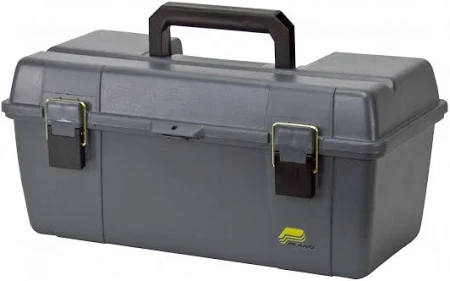Throughout the years, I have habitually displayed small mementos and pictures on a bookshelf in my office or classroom. I inherited this practice from my late father, who used his decorative flair to proudly display objects and pictures that told a story, shared a memory, and painted a portrait of his life.
The artifacts in my display continue to inspire the retelling of old stories and memories of past trips, experiences, and adventures. A makeshift nameplate, carved from an old stick by my grandfather during a childhood camping trip, serves as the gateway to my kingdom of memories. Inside are the remnants of my former athletic career, reminders of childhood heroes, tacky souvenirs, and pictures of past days.
As I glance across my display, I notice a tiny, dollhouse-sized replica of a toolbox. I have to chuckle at the thought of displaying such an ordinary item, considering its everyday presence in most households and garages. This miniature toolbox brings to mind another, with an unusual story, that once sat alone on the sideline of a football field, empty and filled only with the crisp autumn air.
Losing Our Minds
In the fall of 1996, I was a sophomore on a talented but underachieving varsity football team. If victories were won solely on the passion and heart of our coaches, we would have been undefeated. Our head coach, Mike Vertucci, was a positive force who went to great lengths to inspire and motivate us, even though our team often failed to meet the potential he saw within us.
One week, our team faced an underwhelming opponent known better for their 33-game losing streak and even featured on ESPN. Like any good coach, Coach V appeared to be ramping up his efforts to prevent his team from falling into complacency. Despite his best efforts, our overconfident team brushed aside our coach's words.
Our personalities and teenage egos sometimes prevented us from appreciating the value and sacrifices our coaches made for our benefit. We didn't see their countless hours away from their families, breaking down film and preparing game plans. We took the time they spent with us for granted, not realizing it meant trading a chair at the dinner table or reading a bedtime story. Our arrogance reached a crescendo when a teammate got into an altercation with a coach, and eventually, our team was kicked off the practice field.
The night of the big game finally came, but you could sense something abnormal would happen. Everything that could go wrong went wrong, and despite our subpar efforts, the team known for its 33-game losing streak was victorious on our home field. My teammates and I were stunned. However, our loss created a chain of events I still remember.
An Empty Toolbox
The parents in my community had a reputation for being highly invested in their children's athletic success by any means possible. We had several Division 1 athletes on our team, which created a certain intensity to coax us out of our slump immediately. With the intensity of an act of Congress, resources were pooled together to hire a sports psychologist to talk to our team the following week.
My teammates and I stumbled begrudgingly into a classroom the night of the event, unsure of what to expect. We were introduced to a sports psychologist, who greeted us with pleasantries and orchestrated a series of motivational soundbites and visualization exercises.
We were unsure what to expect when he placed a plastic toolbox on the desk in front of him. Some of my teammates shot sarcastic smirks and glances among each other, questioning the man in front of us's sanity. Sensing our growing skepticism, he continued unfettered and opened the toolbox to reveal… completely empty contents.
For several minutes, he explained the purpose of his Walmart purchase. This gift to our team was meant to serve as a receptacle for our fears, mistakes, and poor attitudes hindering our success. Whenever we encountered one of these obstacles, we were instructed to walk over to the toolbox, visualize grabbing the adverse event or emotion, and throw it inside, slamming it shut.
As silly as the culmination of all these events may seem, it left a profound impression on my teammates and I. As our coaches began to incorporate the toolbox and visualization exercises into our daily routine, we understood the connection between a focused mind and success. Success is not the absence of fear but the courage to overcome it.
Conclusion
To most, a toolbox is just a container, but to those who look deeper, it tells a rich history through its dents, rust marks, and scratches, each representing a lesson learned. In its simplicity, a toolbox holds the keys to growth, resilience, and new beginnings. It's not about how we got the nicks and dents, but how we surrendered our mistakes, learned from them, and moved forward.
Although I have made more mistakes than I can remember, I have always remembered the message of the empty toolbox and the promise of a new beginning. It's realizing that mistakes are an inherent part of life, offering opportunities for growth and valuable lessons when we learn from them, make things right, and move on.








No comments:
Post a Comment